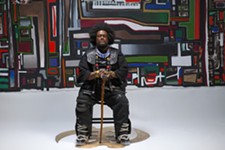Kyle Henry Calls for a National Family Intervention in Time Passages
AFS Doc Days selection delves into the challenges of family archives
By Richard Whittaker, 7:00AM, Thu. May 2, 2024

Time Passages, the new film from Kyle Henry, looks like a portrait of a filmmaker contending with the death of his father and the creeping mental decline of his mother. However, Henry suggests that it’s more than that, that it represents “a moment for our national family to have a crisis intervention.”
The filmmaker, now an associate professor at Northwestern University in Chicago, brings the film back to his longtime home of Austin this week as part of Doc Days 2024, Austin Film Society’s annual celebration of true-life filmmaking.
It’s no secret that documentary filmmaking can be a tough career, but that doesn’t put Henry off. “I make films that I have to make,” he says, “and luckily I’m in a position where I can follow where my passion takes me, and not where the marketplace dictates.” Moreover, not only is he capable of making films that are not readily pigeonholed as commercial but he actively seeks out emotionally complicated narratives. “I want to transform myself through the process of making a film, and I hope other people are transformed by watching it.”
The compulsion, as he describes it, to catalogue his family archive began in 2013, “as my father lay dying.” It’s a common enough experience, he explains, “trying to hold on to the past. … We want, at a certain point in our lives, to understand our story in a larger context.” But the context expanded dramatically with his mother’s declining mental health, the cost of her residential care, and the gathering cloud of the pandemic all affecting him and the material.
Moreover, the family archive and his own memories began to clash, as the pristine Texas nuclear family he saw in those photos, videos, and 16mm home movies sat at odds with the imperfections of his parents, and the strains within their marriage. This is where an unexpected character entered the story: The Kodak Corporation.
Henry explains, “We were constantly advertised to an archetypal story that we were supposed to be telling with our archives, and obviously not every family’s archive tells that story. That story is an ad.” However, it created a boom in families – especially American families – stockpiling unprecedented collections of images, still and moving. “I don’t know if that happened in other countries, but in the United States if you were middle class – and my parents were solidly middle class – that began the documenting of our lives.” It was also in the blood for Henry: His father was a trained journalist for the Marine Corps in the Midwest, during which time he became interested in photography, “so no shock, I became a filmmaker.”
In this case, he particularly credited them for allowing him to see that real story could still center around his complicated relationship with his mother, but also bring in all those other elements: or, as he puts it, “Karen and Abbie helped rescue my mother from me.”
It was Vandersnick, he explains, that proved to him that there was the potential for a film here. She edited together what became the opening sequence, garnered from voicemails from his mother that Henry had saved “but I couldn’t bear to listen to them. Abbie constructed this record of someone’s mind falling apart, just from the messages.”
As for Skloss, she and Henry go back two decades, as friends, political activists (“when the Iraq war protests were happening, she was there with her baby, meeting up with me and a bunch of people at my house and marching down Congress”), and members of Austin’s film scene. Moreover, she was working on a similar project, her AFS-backed film Mr. Jerry about coping with her father’s Alzheimer’s diagnosis during the pandemic, and so understood implicitly what Henry was going through – not just as a filmmaker, but as a son. “I trusted Karen’s instincts in finding the human story in this mass of material,” Henry says. “She understood that the personal is political, and she understood that even in our family archives there are conversations that can and probably need to occur about the countries and nations and societies that we live.”
For Henry, who is an experienced editor himself, having those other voices in the room was the best argument for not doing the job himself, especially on such a personal project. “The artistry and the distance that I provide to other filmmakers, I needed that myself.” As a result, Time Passages “is not just a personal film,” he says. “It’s a collaborative film about memory, time, family, and this intense mother-son bond.”
What Henry realized through the filmmaking process was that his parents “had faults and limitations, just like I do,” and that he had to accept those complicated traits in them just as they had in him. “Children try to control the story of who their parents were, for their own benefit, which is great and fine and we all need to do that. But they will also always be somewhat of a mystery to us because they have huge sections of their lives that they lived without us there, and we need to just be fine with letting them be.”
Time Passages screens as part of AFS Doc Days 2024. Tickets and info at austinfilm.org/doc-days-2024.
A note to readers: Bold and uncensored, The Austin Chronicle has been Austin’s independent news source for over 40 years, expressing the community’s political and environmental concerns and supporting its active cultural scene. Now more than ever, we need your support to continue supplying Austin with independent, free press. If real news is important to you, please consider making a donation of $5, $10 or whatever you can afford, to help keep our journalism on stands.
May 16, 2024
May 17, 2024
AFS Doc Days 2024, Time Passages, Kyle Henry, Jason Wehling, Karen Skloss, Abbigail Vandersnick








